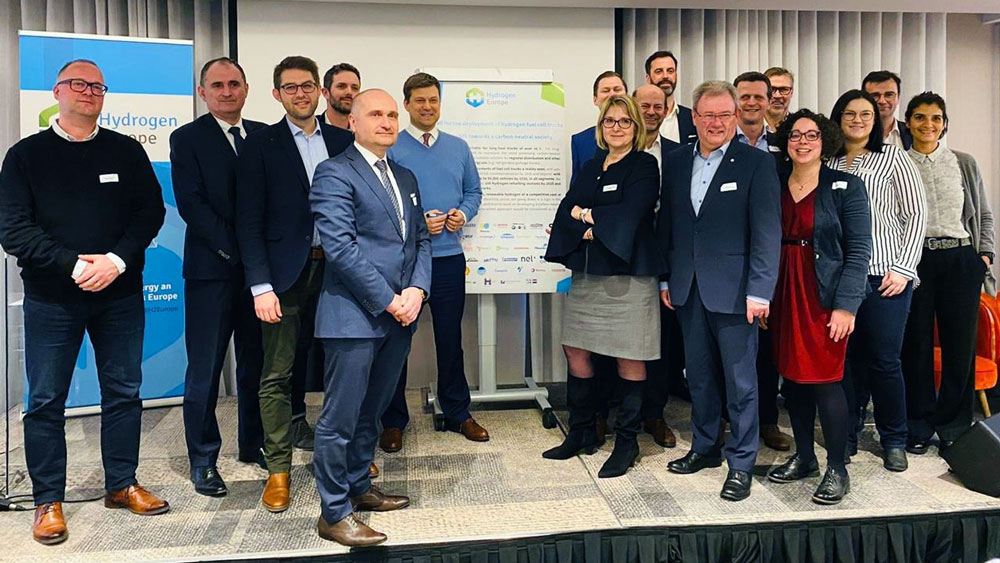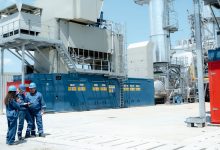Deployment of Hydrogen Fuel Cell Trucks
The transport sector is responsible for a quarter of the EU’s greenhouse gas (GHG) emissions, so drastic changes in the transport sector are required to meet the 90% reduction in GHG emissions set out in the Green Deal. It is, therefore, vital to completely decarbonise the truck sector to meet the EU objectives. Hydrogen-powered trucks are an essential, promising solution to achieve this goal without compromising operational flexibility with a range, refuelling time and payload closer to combustion engines.
To help foster discussions and actions towards these goals, on March 5, Hydrogen Europe organised the ‘Hydrogen fuel cell trucks: paving the road to a carbon-neutral Europe’ event. This occasion also marked the unveiling of a joint call for the deployment of fuel cell trucks.
This event brought together about 150 attendees, among which leading truck industry experts, EU decision-makers, end-users and infrastructure providers to discuss the acceleration of the mass-market deployment of hydrogen fuel cell trucks and their infrastructure. The event was the first of its kind in Brussels, and many attendees and high-level speakers illustrated the growing momentum of hydrogen fuel cell trucks as a solution to decarbonise the heavy-duty vehicles sector.
Henrik Hololei, DG MOVE’s Director-General, opened the event: “Hydrogen is the most promising pathway for decarbonisation. It’s ideal for heavy duty trucks and buses. It is important to accelerate our efforts to bring hydrogen fuel cell technology to the European market because it is instrumental for meeting the objectives of the Green Deal”.
“We need a European green hydrogen strategy in order to use all synergies across the EU and stimulate economic growth,” MEP Ismail Ertug added.
This occasion also marked the unveiling of the ‘Joint call for the deployment of hydrogen fuel cell trucks: a needed shift towards a carbon-neutral society’, a letter of intent which aims to promote fuel cell trucks and show that the supply side is preparing to deploy the vehicles – including key component such as storage tanks and fuel cell systems, as well as the hydrogen refuelling infrastructure.
43 major companies representing the whole supply chain have pledged their support for this letter and showed their dedication to deliver carbon-neutral hydrogen freight. The main commitments outlined in the letter are:
- To make large-scale deployments of fuel cell trucks a reality soon, with pre-commercial series ready by 2025 (5000-10 000 vehicles) and full commercialisation by 2030 (95 000 vehicles). Around 100 hydrogen refuelling stations will be needed by 2025 and 1000 by 2030 to refill these trucks.
- To deliver low-carbon, renewable hydrogen at a competitive cost at the nozzle.
Several conditions are necessary to make this happen:
- A reward mechanism for early adopters and bridge to mass market adoption.
- An ambitious revision of the Alternative Fuels Infrastructure Directive in 2021.
- Better coordination of vehicle and infrastructure supply and demand to help identify the best refuelling locations.
- Strengthening existing and future co-financing and financing schemes (e.g. CEF, ETS).
- Harness Europe’s strong competitiveness and create an ambitious hydrogen strategy at European level.
Gerrit Marx, President Commercial ad Specialty Vehicles at CNH Industrial, Jan Krönig, Head of Strategy, Daimler Trucks and Mark Freymüller, CEO, Hyundai Hydrogen Mobility during their panel all agreed that hydrogen in long-haul is a way to decarbonise the heavy-duty sector focusing on the needs and demands of the customers.
Valérie Bouillon-Delaporte, President of Hydrogen Europe, closed the event with the following words: “Today we are seeing that hydrogen for trucks could be a game changer, not the silver bullet but one of the technologies that can help achieve the European Green Deal. We need to work together to accelerate the pathway, cut the costs and develop policies that will help us to meet our targets”.
Paving the road to a carbon-neutral Europe is not an impossible task. Events and initiatives such as those mentioned above are of critical importance to ensure a clean future at European and global level, in which hydrogen has a key role to play.







